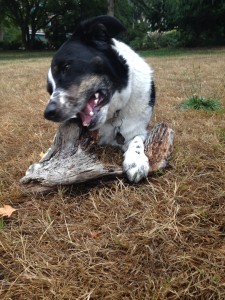Caveat: I am not a veterinarian, nor a canine nutritionist, but I am a (human) nutritionist and have a healthy four [now 8!] year-old pooch who I transitioned to a plant-based diet after I got her from the SPCA when she was 8 weeks old. Feeding her is a breeze, largely thanks to the availability of a good vegan dog kibble and canned food (I use Natural Balance), and a range of vegan treats.
For a while I cooked all her food myself, but that made things a little difficult whenever she wasn’t with me. If you’re travelling to the States at all, it might be worth tracking down V-Dog. They have recently resumed importing to Canada but the food is shockingly expensive. It is really good vegan kibble, though, and they have some vegan dog treats (although I find that the breath bones can upset Kali’s digestion). Evolution Diet is another option, although the vitamin D in the kibble appears to be animal-derived.
It’s totally possible to create excellent homemade vegan dog food, though, and there are some good resources available on vegan dog nutrition. I worked with a start-up company a few years ago that was trying to launch a vegan dog nutrition brand here in Vancouver. They stalled a bit (which was disappointing!), but are now conducting feeding trials at a greyhound rescue facility up north. In the course of working with them and the veterinarians involved, I spent a long time researching dog nutrition and canine health, so I’ve got a pretty firm handle on the current state of research and am in a good position to be able to answer questions about a plant-based diet for dogs and the benefits and risks of vegan dog nutrition.
A few basic things to consider:
- Dogs are non-obligate carnivores, meaning that they are absolutely able to survive and thrive on an entirely plant-based diet. Most people will argue with you about this because most people conflate normal, natural and essential, stating that wild dogs or domesticated dogs left to their own devices will opt for eating meat every time over vegetables etc., offering this as a demonstration of the necessity for dogs to eat meat. While it is true that a dog will generally pick meat over anything else, largely because it is smelly, highly calorific and offers efficient nutrition, that’s not to say that meat is optimal for dogs. Indeed, although a meaty diet can facilitate short-term survival, it has been shown to be disadvantageous for long-term canine health in a number of ways (similarly to humans).
- Dogs do have different digestive anatomy to humans and slightly different nutrition requirements. These requirements also depend on breed, age, size and activity level. For example, a vegan diet can pose some difficulties for puppies as plant-based foods have a much higher fibre component than an all-meat diet. As dogs have a shorter digestive tract than humans, this means that plant foods can rush through the dog without giving them the chance to absorb the nutrients and calories they need. A lot of fibre can also create digestive discomfort, diarrhoea and lead to anal gland problems in dogs. Keeping fibre intake on the low side is helpful, especially for puppies and dogs not yet used to a fibrous diet.
- Many plant foods are toxic to dogs. As such, it is helpful to have a general rule that just one person (or two) feeds the dog, so as to minimise risk of people feeding a pup grapes or raisins or cashews etc. because they think all vegan foods are fair game if the dog is eating carrots and so on. A good list of toxic foods can be found foods that are toxic to dogs . Check out this useful post on how to build a safe garden space for dogs too, as many backyard plants are also toxic to dogs.
- Finding good commercial vegan dog treats that are suitable for training a puppy can be tricky. The reason for this is that most are crumbly, large and not really all that smelly. Using trial and error, I found that some of the best training treats for carrying in a treat pouch or pocket are tiny bits of vegedog, roasted chickpeas with a dash of liquid smoke, popcorn with nutritional yeast and garlic, fresh sweetcorn, fresh raw English peas, and homemade biscuits with molasses (there’s a recipe vegan dog biscuit recipe) made into tiny kibbles. It’s also helpful to stuff a Kong with mashed banana and peanut butter and carry this with you on walks or at the park as a way of distracting your pup and keeping their focus on you (if they want the treat they have to keep their focus on the Kong and, by extension, you, rather than just grabbing it and running off back to whatever mischief they were getting into). My pup also loves kale chips with nutritional yeast, coconut oil and hemp seeds, but these are only for in-house training as they’re messy in a pocket and just crumble!
- When making food at home, or choosing commercial food that will be all a dog eats, it is thought best to aim for 25-30% of calories coming from protein (the higher end for puppies), about 25-30% from healthy fats, and the rest from carbohydrates. The kibble I use is 18% protein, while the canned is just 5%, so I usually add in high protein treats throughout the day, or mix peanut butter, tofu, chickpeas or beans in with her food. I also add in chia, flax and hemp seeds, and use hemp oil, pumpkin seed oil, tahini and algal oil to boost Kali’s healthy fat intake
.
Resources to help you with vegan dog nutrition
Given all the things above, here are some resources you might find useful when deciding whether to go for a commercial kibble or to make food for Murphy yourself:
- This is a super handy and succinct list of foods with quantities to make homemade meals – homemade vegan dog food list
- This extensive post has recently been reviewed by vegan vet, Armaiti May (who I worked with briefly) – veganpoet.com vegan dog food
- This post has a lot of great ideas, although it hasn’t been reviewed by a vet, and I haven’t reviewed it recently either, so be sure to double check claims – Veganheartland.com
- This post I wrote about protein for dogs – Indogo
- This is a handy recipe, and similar to what I used to make for Kali (minus the unnecessary enzyme supplement) – peta.org
And, here’s another vegan dog biscuit recipe I devised!
There is a lot of bad information on the Internet about dog food, and it can be very disheartening to read any comments on articles, but feeding your pup a plant-based diet is a great choice for their health, the environment, your finances (possibly!) and for the animals they don’t end up eating.
Hopefully this post on vegan dog nutrition is a good start for information and inspiration, but please do get in touch if I haven’t covered anything here that you’re curious about. And, let me know how your pups are doing if you’ve switched them to a plant-based diet!
 Want carbon-neutral webhosting with great customer service? Try DreamHost and use code 'Vegans' for a third off!
Want carbon-neutral webhosting with great customer service? Try DreamHost and use code 'Vegans' for a third off!





{ 0 comments… add one now }